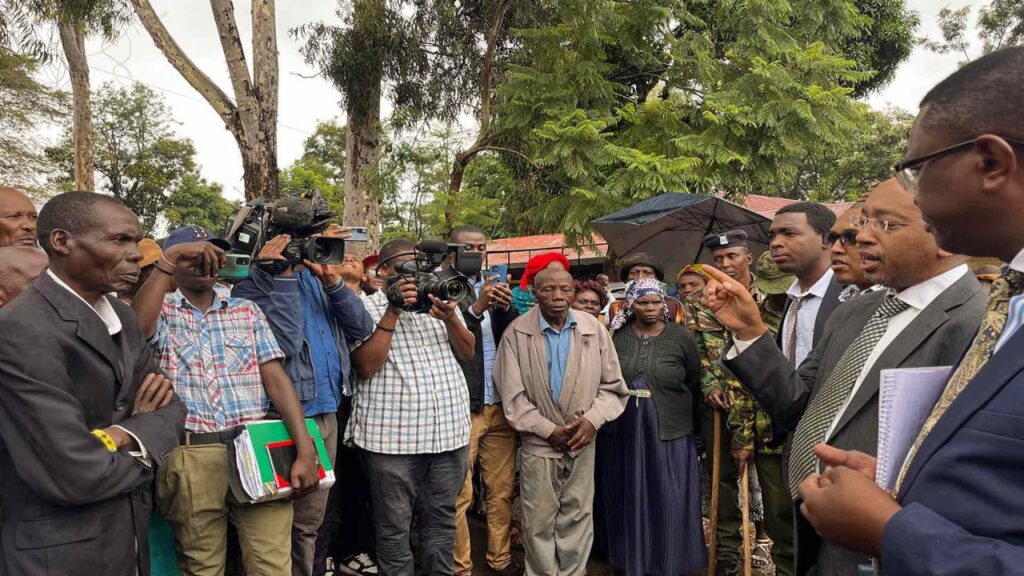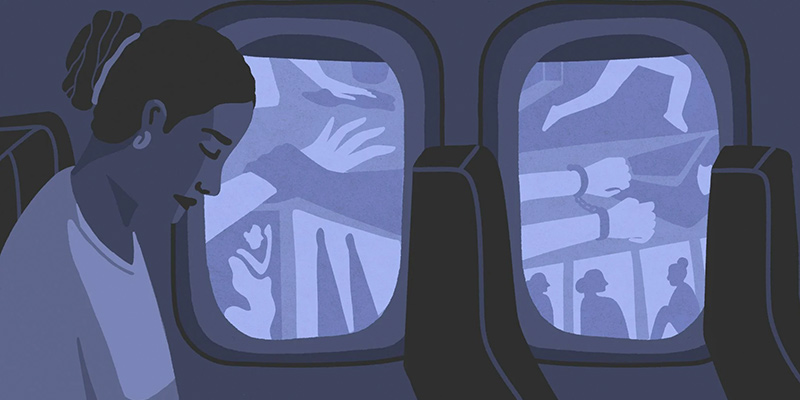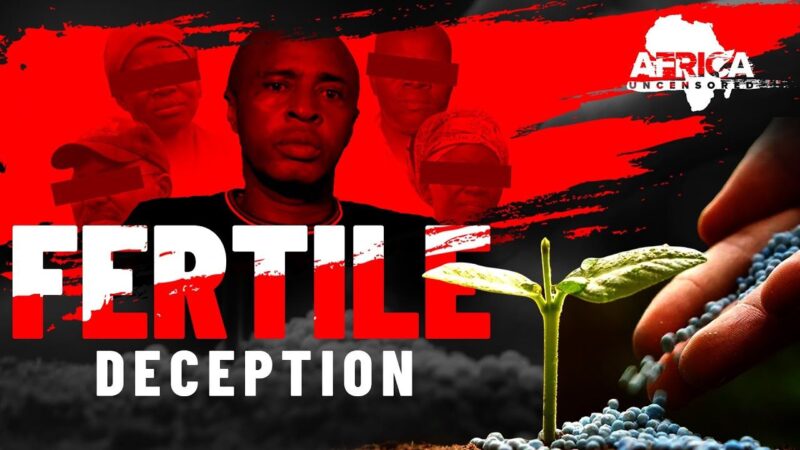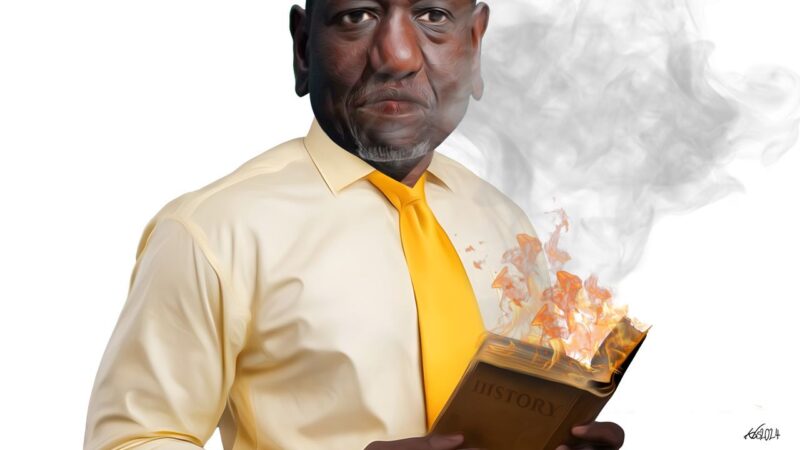[vc_row][vc_column][vc_column_text]Boniface Gikunda struggled to pay his bills even more than usual under Kenya’s COVID-19 restrictions. Some days, the professional driver went without a single customer call from the three driving app services that dominate Nairobi: Uber, Taxify, and Little Cab.
But what weighed heaviest on his mind was a government mandate that required him to get a new driving license by July 1. The digital license costs 3,000 Kenyan shillings (around US$30), double the previous fee and, according to this investigation, potentially double the cost of production.
“Three thousand shillings for a Kenyan like me?” Gikunda asked rhetorically. “It’s just ridiculous for a normal driver.”
He estimates that in ordinary times, after covering the fees he pays to the driving apps and the car’s owner, plus expenses like fuel and parking, he takes home roughly KSh 500 to 800 a day. The cost of the new license could cover a week of food for him, his wife, and their son, who live in a small one-bedroom home on the outskirts of Nairobi. In his native Meru County, near Mount Kenya, the fee could cover three months of rent.
“We survive by the grace of God,” Gikunda told reporters.
To afford the license, he said he is considering borrowing money from Kenya Commercial Bank (KCB), despite its personal loan interest rate of 13 percent. “At that point,” he said, “you’re desperate.”

Gikunda didn’t know that part of the money for his license fee is also likely going to KCB. Last year, the bank bought the National Bank of Kenya (NBK), which unexpectedly won the latest government tender to produce digital driving licenses.
The Kenyan government has been attempting to roll out the new licence for over a decade. A similar tender was previously awarded to Semlex Group, a Belgian biometric solutions firm, in 2008. That contract fell apart due to political wrangling.[/vc_column_text][vc_column_text]

A trove of leaked Semlex emails and documents analysed by Africa Uncensored, The Elephant, and OCCRP shed light on the politicised procurement process behind the digital driving license tender. The documents reveal how the individuals involved in the contract planned to personally make millions of dollars — including Semlex CEO Albert Karaziwan, his Kenyan broker Mujtaba Jaffer, and unidentified consultants — at the expense of ordinary Kenyans. Moreover, internal deliberations regarding production costs and profits indicate the price of the current digital driving license may be significantly inflated.
[/vc_column_text][vc_column_text]Reporters did not find evidence of illegal activity.
The Brokers
Semlex Group was no stranger to Africa when it set its sights on Kenya.

The Belgium-based company had already won tenders to provide biometric products in the Comoros Islands, Guinea-Bissau and Madagascar, by making friends in high places. So, when it came to bidding for the contract to produce Kenya’s new digital driving licenses in 2008, Semlex CEO Albert Karaziwan made sure he had his local brokers in place from the start.
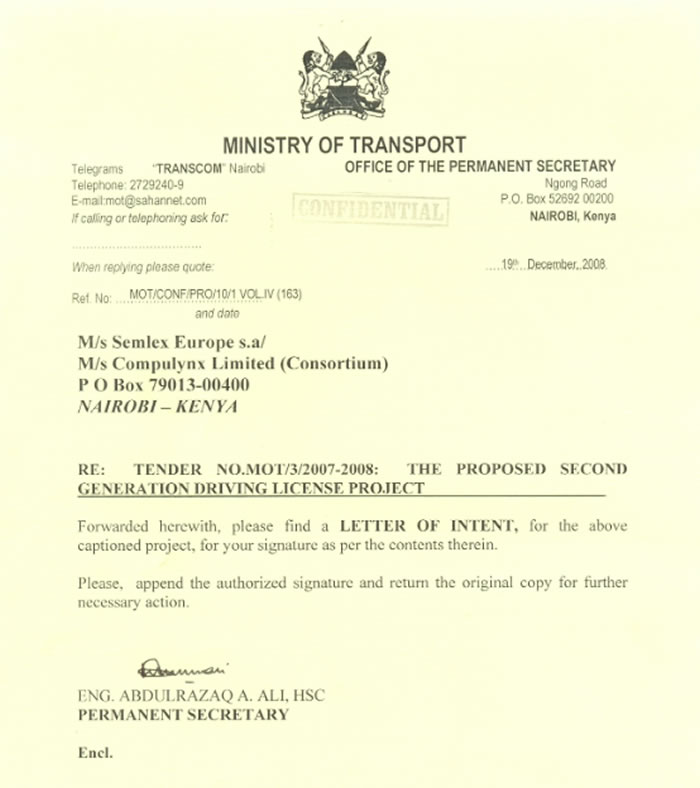
Credit: OCCRP
One of them was Sheila M’Mbijjewe, then a Central Bank of Kenya committee official and now the state bank’s deputy governor. At the same time she was also a director in two obscure Kenyan companies owned by the powerful Mombasa-based tycoon, Mohamed Jaffer, and his son Mujtaba Jaffer.[/vc_column_text][vc_column_text]M’Mbijjewe was an effective fixer and coordinator, who appeared to work through unnamed connections in the Ministry of Transport to ensure that the ministry’s driving license tender was awarded to Semlex. Then Mujtaba Jaffer took a leading role as the broker between Kenyan officials and the Belgian company, emails indicate.[/vc_column_text][vc_tta_accordion style=”modern” shape=”square” color=”chino” active_section=”1″ collapsible_all=”true”][vc_tta_section title=”Friends in High Places” tab_id=”1602836598492-32c94b26-60db”][vc_column_text]In addition to M’Mbijjewe, other Kenyan brokers involved in the tender were also directors in the Jaffers’ nominee companies, Computer Source Point Ltd. and Infocard Africa Ltd:
- Brown Ondego, who was previously the head of Kenya Ports Authority and at the time executive chairman of the controversial Rift Valley Railways consortium. He is listed as a director of two other Jaffer companies, Grain Bulk Handlers Limited and African Gas and Oil Ltd.
- Kung’u Gatabaki, a corporate director who appears on the board of over a dozen companies owned by the late politician Njenga Karume. Soon after the Semlex tender he became chairman of the powerful Capital Markets Authority. Gatabaki is still listed as marketing director at Grain Bulk Handlers Limited, though he told reporters he is retired and keeping a low profile.
- Sailesh Savani, the CEO of CompuLynx, Semlex’s technical partner on the tender. Savani was also on the board of the supermarket chain Nakumatt as well as the Kenya Bureau of Standards technical committee.
M’Mbijjewe, Ondego, Gatabaki and Savani did not respond to multiple requests for comment. Mujtaba Jaffer said Computer Source Point and Infocard Africa are no longer active.[/vc_column_text][/vc_tta_section][/vc_tta_accordion][vc_column_text]

In one email, Jaffer — who regularly referred to the Semlex CEO as “brother” — referenced a late-night meeting with the Minister of Transport. In another, he gave Njenga Karume, one of Kenya’s longest-serving and most influential former MPs, his “blessing” to make decisions on his behalf about the contract.[/vc_column_text][vc_column_text]Jaffer told Africa Uncensored that the powerful politician was “an acquaintance of the family,” and denied any improper influence in the procurement process.
“I cannot recall every meeting as some time has elapsed since these events but I can confirm that any meeting with state officials would have centred around technical consultations,” he wrote in an email.
All of the communications between the Kenyan brokers and the Belgian firm went through Grain Bulk Handlers Limited, the Jaffers’ flagship company known for its decades-long monopoly over Kenya’s bulk grain imports, allegedly with the assistance of friendly politicians. Another family company, African Gas and Oil Ltd. (AGOL), reportedly handles and stores three-quarters of the country’s Light Petroleum Gas imports.
Jaffer said the media’s characterization of his family as political financiers who benefit from lucrative government contracts in return is unfair. “We have not openly come out backing any political party or candidate. On the contrary our business concerns have been vital to the Kenyan economy and the ordinary mwananchi [citizen],” he wrote in an email.

Credit: Diplomat East Africa
[/vc_column_text][vc_column_text]

Credit: OCCRP
When the Semlex driving license contract was derailed by an apparent rivalry between officials at the Ministry of Transport and the Ministry of Finance, it was Jaffer’s company that drafted a letter to then Prime Minister, Raila Odinga, for Semlex to send. At the time, the Finance Ministry, which refused to co-sign the contract, was headed by Odinga’s main political rival, the current President Uhuru Kenyatta.
This time, Semlex’s political connections weren’t enough. Internal documents show numerous attempts to force the Finance Ministry to add their signature to the contract, to no avail.
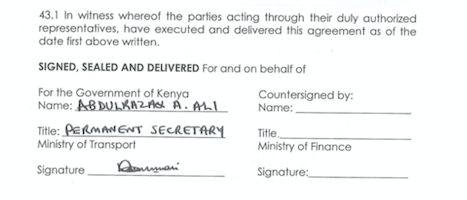

[/vc_column_text][vc_column_text]The Semlex consortium sued the Ministry of Transport for breach of contract in 2012, but the government argued that the contract was never finalised.
That year, the responsibility for issuing driving licenses was handed over to the newly-formed National Transport and Safety Authority. Kenyatta was elected president in 2013, and the tender was relisted through NTSA the following year.
The Breakdown
Leaked internal documents reveal the gap between what the biometrics company and its brokers expected to earn, well above the KSh 2.8 billion ($35 million) awarded by the government.
Documents show the company expected to produce 2.5 to 3 million digital driving licenses over five years, at a 15 percent profit. This means the cost of production for each driving license, profits included, would amount to $11-14 — less than half the fee being charged to drivers like Gikunda today.
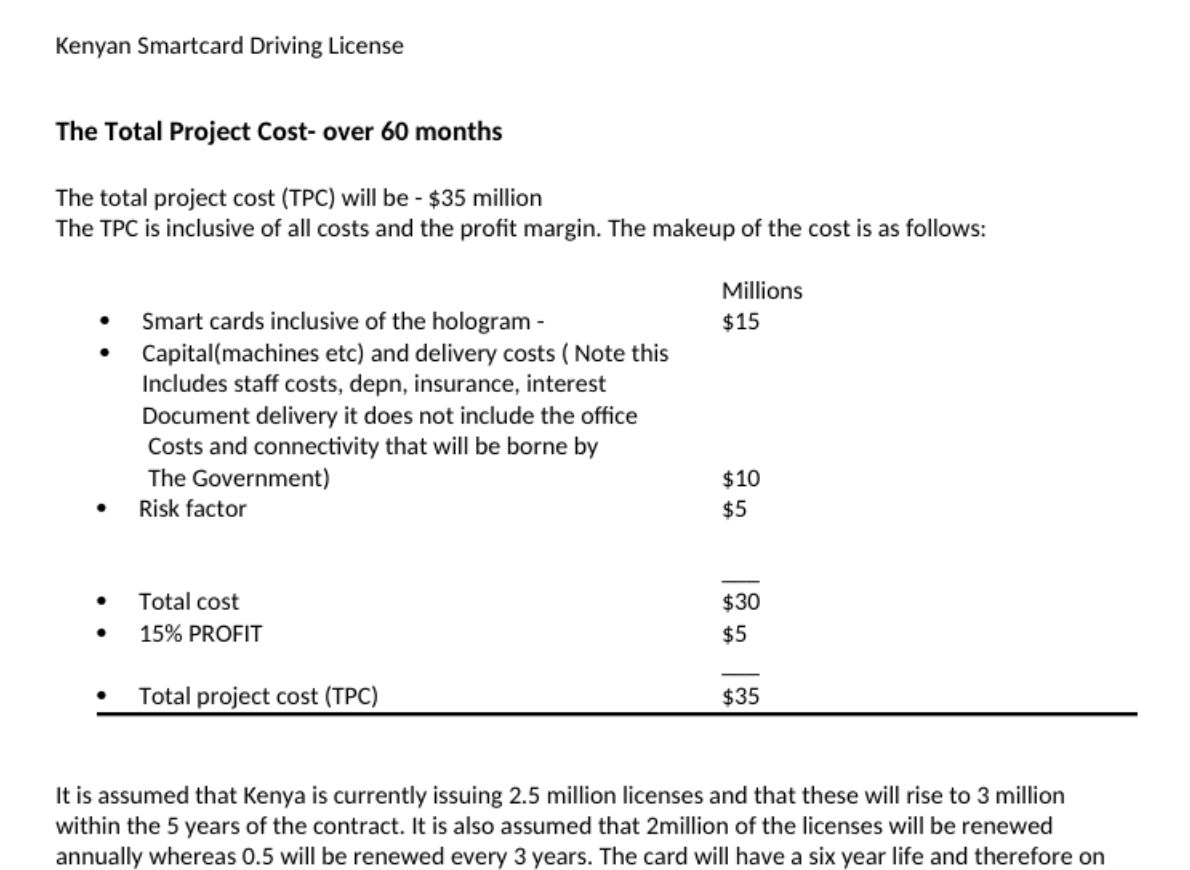
Credit: OCCRP
[/vc_column_text][vc_column_text]Despite this breakdown, a draft agreement between Semlex and the Ministry of Transport states the company actually expected to collect $20 for each card. With 2.5 to 3 million licenses issued, Semlex would have collected $50-60 million.
The same agreement states that Semlex would reimburse the government anything above $20 per card. With today’s licence fee — the Ministry of Transport would have collected $25-30 million from the arrangement.
But an internal profit-sharing agreement drafted in January 2009 revealed even higher expectations. It stated that the “actual costs” of the project would not exceed $17 million, and earmarked an additional $4.4 million for unnamed “consultants.” According to the agreement, Semlex CEO Karaziwan and Grain Bulk CEO Jaffer would split the remaining profit which, from the government award alone, would amount to $6.8 million each. The agreement stipulated that they would also split “any additional bonuses.”

[/vc_column_text][vc_column_text]The unexplained consultant fee is so substantial that a transparency expert who reviewed the terms of the deal, but requested not to be named, said it could have “no conceivable” legitimate justification.
Semlex did not respond to requests for comment, and Jaffer denied that the payment was allocated for kickbacks. He declined to provide an explanation, however, saying he was “bound by confidentiality not to discuss certain matters.”
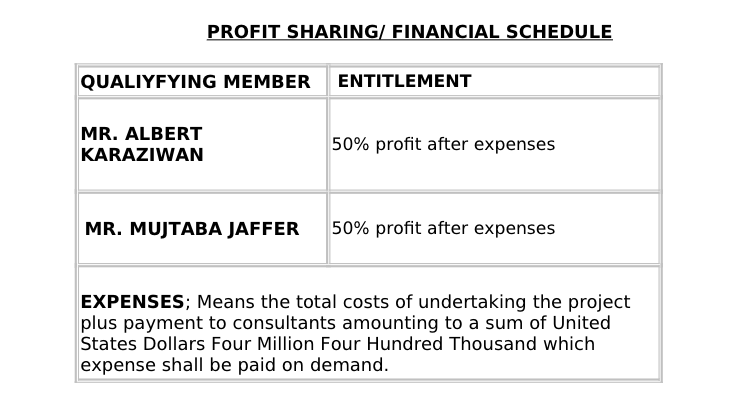
[/vc_column_text][vc_column_text]“Companies like Semlex that have been implicated in corruption around Africa work in deniable ways, through consultancy fees that cannot be explained and the like,” said Alvin Mosioma, head of Tax Justice Network Africa.
“The narrative of corruption reduces actions to individuals but the reality is that the entire government policy machinery has been captured by corrupt elites in collusion with private entities who see the public purse as the most lucrative avenue to loot and plunder. In Kenya, the network of corruptivity revolves around these ‘tenderprenuers’,” Mosioma added.
The New Players
The selection of the National Bank of Kenya as the winner of the NTSA’s re-listed digital driving licence tender in 2015 was unexpected, especially when its competitors included international biometric giants.
Even before the NTSA announced the winner, the bank’s selection as a finalist was challenged on the basis that it was both the bidder and its own financial guarantor, in potential violation of Kenya’s procurement regulations. The Commercial Bank of Africa — co-owned by President Kenyatta and his family — stepped in to guarantee the NBK bid and secure its contract.

[/vc_column_text][vc_column_text]There were questions about the bank’s qualifications to produce biometric documents, as well as its reputation. NBK was infamous for using taxpayer money to make up for unpaid loans handed out under shady circumstances. Regulators also cited the bank’s board members and senior managers for allegedly misrepresenting financial statements and embezzling funds.
NBK’s technical partner — a little-known startup called Pesa Print Ltd. — also had no experience in producing biometric documents. The company was started by two obscure Kenyan firms: EyeSeeYou Communications and Kenya Twelve Ventures.
Two individuals who appeared on EyeSeeYou registration documents had also worked for Njenga Karume, the late politician who appeared in the Semlex deal. According to the founders, EyeSeeYou and Pesa Print parted ways around the time of the driving license contract was won. The owner of both Kenya Twelve Ventures and Pesa Print, David Njane Ruiyi, said the contract was won competitively.
The finalists that NBK had beat out included the previous winner Semlex, French biometrics company Gemalto S.A., and the established Kenyan ICT provider Symphony Technologies, which lost to NBK by less than one percent.
Njane, Pesa Print’s co-owner, told Africa Uncensored that NBK’s qualifications came from the entire consortium, which included two European companies with technical expertise: X Infotech, headquartered in Latvia, and Austria Card, based in Vienna. Both companies cited Pesa Print as the primary contractor in the consortium.

[/vc_column_text][vc_column_text]When NBK’s competitor, Symphony Technologies, launched a legal complaint against the government’s selection of the winner in the driving license tender, Pesa Print paid the company KSh104.5 million (about $1 million) to drop the challenge.
According to court documents, Pesa Print borrowed part of that money from companies reportedly owned by Meru County Senator Franklin Linturi. The senator reportedly borrowed the money from a bank patronized by his girlfriend, Marianne Kitany, who at the time was chief of staff to Deputy President William Ruto.
Pesa Print, the court documents said, was due to repay the loan within 48 hours of NBK receiving the first tender payment from the government. But things got messy and ended up in arbitration, where the documents were produced describing the payoff arrangement.
Symphony ceded the contentious contract to NBK. “We agreed to drop the case as a settlement was agreed and for public good (to avoid vendor issues that cause many government project delays and lengthy court processes),” Symphony told reporters in an emailed statement.
Pesa Print confirmed the payment, and said the financial arrangement with Linturi was purely transactional. The senator could not be reached for comment.

According to Njane, Pesa Print has already delivered the technology and base printed cards to the NTSA. However, one party in the consortium told reporters that card production had stalled even before government agencies shut down during COVID, and that the company was shopping around for new technical partners.[/vc_column_text][vc_column_text]NBK did not respond to questions, but its parent company KCB Group told reporters in an emailed statement that “NBK, as the contracting party is executing its obligations and the covenants of the NTSA driving license contract as required.”
It’s unclear when the long, storied journey of Kenya’s digital driving license will be fulfilled. With the terms of the current KSh2.1 billion contract a secret, it’s also unclear exactly how much the government and the companies — as well as any politically connected brokers — stand to earn.
Meanwhile drivers like Gikunda will pay the price.
“I don’t know why the government had to come [up] with such a figure,” said Gikunda, lamenting the KSh 3000 cost of the digital license. “I don’t know what’s so special about the card.”[/vc_column_text][/vc_column][/vc_row]



